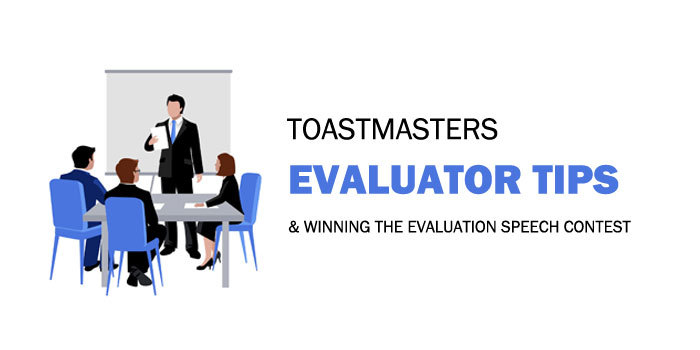Toastmasters Evaluator Tips & Winning the Speech Evaluation Contest
If you’re looking for tips on how to be a better Toastmasters evaluator, you are at the right place.
I have compiled a list of my best speech evaluation tips that I learnt from workshops, mentors and courses over the years.
Whether you are a new Toastmaster starting your evaluation journey, or an experienced one looking to win the speech evaluation contest, this guide is for you.
The first part covers general tips on being a more effective evaluator in a Toastmaster club meeting and the second part covers tips for winning the evaluation contest.
Why Give Evaluations?
In Toastmasters, the way we learn to be a better speaker is by listening to other members’ feedback. The closest thing to a teacher is an evaluator.
We get immediate feedback on where we did well and how we can improve.
By giving evaluations, you not only help the speaker, you help the audience members learn and more importantly, you help yourself.
Before you could suggest something, you have to be clear on it yourself. And by being clear, you improve.
The 2005 World Champion of Public Speaking Lance Miller said:
I am a firm believer that if you want to be an excellent speaker, you have to be an excellent speech evaluator. You cannot do one without the other."

Lance Miller
WCPS 2005
Giving evaluations is a real-world skill as well.
How many times do you have to give feedback in your professional and personal life?
Pretty much everyday if you work with people or have children.
You can give feedback and be met with resistance or you can learn to give feedback that encourages the other party and have him accept your feedback openly.
Let's start, evaluators.

How to Be an Enriching, Encouraging and Effective Evaluator
Share the WHAT, HOW & WHY
When you comment on something, do not just mention the WHAT and move on to the next point.
For example, “you have good vocal variety.”
That alone doesn’t mean anything. Share how he demonstrates good vocal variety and why it matters.
- (WHAT) You have good vocal variety.
- (HOW) You raised your voice and spoke faster at the exciting parts of your speech, and you slowed down and lowered your voice at the serious moments.
- (WHY) When you do this, it breaks our patterns and holds on to our attention for the entire speech.
In this example, the benefit is: holds on to our attention for the entire speech.
You can be more specific and share the exact moments he does these. For example, “...at the exciting parts of your speech, like when you went to Disneyland with your family”.
Or “...at the serious moments, when your grandmother went to the hospital.”

This is even more important when you recommend an area of improvement.
Let’s say you want the speaker to have stronger eye contact. You could say:
- (WHAT) I feel that you could have a stronger eye contact.
- (HOW) I noticed that you spent a huge amount of time looking at this side of the audience. I cannot blame you; there are beautiful ladies here.
- (WHY) The audience sitting on the other side may feel a little bit neglected.
- (WHAT) What I would suggest is that you spread your gaze across the whole auditorium.
- (HOW) Look at each person in the audience as long as you need to make a point. It could be 1s it could be 5s.
- (WHY) By doing so, you would have built a stronger connection with the entire audience.
If you noticed, when giving a recommendation, you’d need to point them out twice. First, what they did and why it’s not good; and what they can do, how they can do it, and why it’s better.
If there is not enough time, you may exclude the first part (what they did) and go straight into the suggestion.
Evaluate the Speech, not the Speaker
As a project evaluator you should be evaluating the speaker’s speech crafting, the speech structure, speech value, speech logic, project objectives and his delivery.
You do not want to evaluate based on your feelings of the speaker.
No.
You also do not want to evaluate based on your opinions of the speech subject. (I don’t agree that global warming is a threat.)
Be objective, take your feelings out, and help the speaker.
Mix Suggestions on Delivery and Speech Logic
Every speech consists of two parts: the speech itself and the speaker’s delivery.
The speaker may have crafted a perfect speech, but if his delivery is terrible, then the speech would not reach the audience’s mind and heart.
The speaker may be a great speaker, but if his speech is poorly-organized, the audience may be left confused.
Try to comment on both aspects.
Here are some parts of the delivery: vocal variety, pauses, body language, gestures, stage movement, eye contact, energy, props, dialogues, powerpoint slides, audience engagement.
For the speech logic: use of stories, a message, call-to-action, structure, humour, presentation of data, rhetorical devices, language, relatability, topic selection, speech purpose.
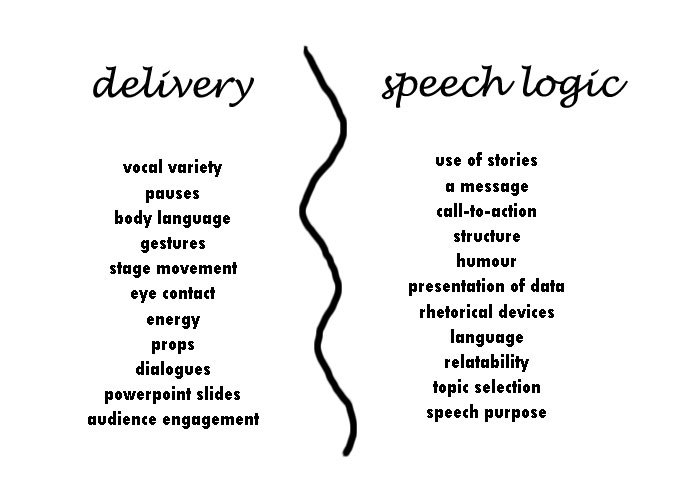
Have a Cheatsheet
See that list of things to look out for above?
You can literally prepare what to say about each point on the list. Prepare a “what I like” and a “what can be improved” about each point. This is your evaluation cheatsheet.
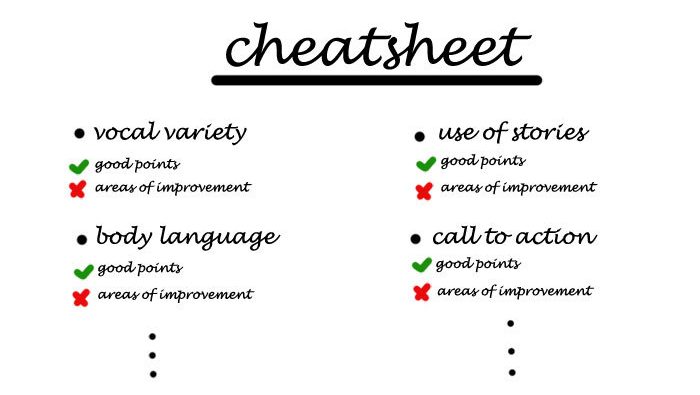
Have the templates ready so that during the speech, you can simply tick off the boxes, extract it from your cheatsheet, and include it in your evaluation.
This one tip is gold. It helped me to win many “best evaluator” ribbons and improved my evaluation skills exponentially.
Do not Whitewash
Yes, in Toastmasters we try to be as encouraging as possible so do point out their strengths. But no one is perfect. We all join Toastmasters because we want to improve.
Imagine your evaluator only praising you without offering any areas of improvements.
How do you know what to work on?
Many new evaluators have this issue as they don’t know what suggestions of improvements to give.
Are you telling me that speech you just evaluated is a World Champion calibre speech?
Even World Champions can be better.
In my experience, if the speaker’s delivery is superb, it usually boils down to content.
Maybe they lack a strong call-to-action? Or could it be more direct and specific?
Perhaps there’s a sudden jump in the story from difficulty to success, without a transformation or resolution?
Maybe they have a weird gesture that is a habit? Point it out to them. A DTM once told me that a first-time evaluator pointed out his unique gesture that he hadn’t noticed before.
Sometimes, we need a new perspective from a fresh pair of eyes.
Do not Blackwash
Similarly, do not only offer suggestions to improve. We want to encourage the speaker, however bad they may be - right now.
One single evaluation could end a speaker’s will to continue his Toastmasters journey.
Afterall, the speaker has put in the effort to prepare his speech and stood up there courageously to deliver it.
At the very least, praise their effort or courage. Remember, we want to point out their strengths so that they know what to continue doing.
Many speakers will tell you to only say what to improve, but they forgot that evaluations are not just for the speakers; they are for the audience to learn as well.
So, point out their strengths and share WHY it matters, so that the other members of the audience may learn from it as well.
Be Tactful with Your Words
Related to the previous point, in Toastmasters we learn to share our opinions in a way that encourages the speaker.
Avoid using negative words. Instead, say how something they did could be better.
For example, instead of saying, “You have weak eye contact”, say “I feel that your eye contact could be stronger.”
“You are monotonous” can be “I feel that you could add more variety to your voice. At the exciting parts of your speech, you could raise your voice and speak faster to demonstrate excitement.”
One way to be tactful is to change the BUTs to ANDs.

The moment you say BUT, the speaker only focuses on what comes after BUT - the negatives. Use AND and they remember both.
“Your speech is great BUT it has a weak conclusion” would be “Your speech is great AND it would be even better if you added in a strong Call-to-Action”.
Don’t say ‘Should’ or ‘Must’
Evaluation is simply your opinion. No one’s opinion is entirely correct - that would be a fact.
There is no right or wrong in a speech, just your thoughts and feelings on how it could be better.
Instead of saying, “you should do this”, you could say “I feel that you could do this”, or “my suggestion is to do this”.
Similarly, there is no “must” or “never”.
“You might want to consider not doing this because…”
There are no absolutes in a speech.
Speak Only From Your OWN Opinion
Do not speak for everyone in the audience.
You may think that the speaker could work on his eye contact, but another audience member may think he has strong eye contact.
You may like his animated gestures, but another person may think that’s too much acting.
You may think his voice is soft, but another could think he is loud and clear.
Use words like “I feel”, “In my opinion”, “My suggestion”.
Do not say “Everyone thinks” or “We all feel that…”
Do Not Repeat the Speech
Many evaluators like to recap the entire speech and I don’t know why.
Firstly, you’re wasting precious time.
Secondly, the audience literally just heard the speech and don’t need the recap.
It’s okay, though, to recap certain parts if it’s related to your point.
For example, if the speaker used 3 stories in his speech, you could say: “I like that you used stories in your speech; when you shared about your time in Singapore, your time in the USA and your time in Europe.”
It’s also acceptable, and even expected, to point out certain phrases or quotes that the speaker used that made an impact on you or added points to his speech.
But do not repeat the entire speech.

Evaluate Based on Speaker’s Level
You’d want to tailor your evaluation based on the speaker’s experience.
For a new speaker giving his icebreaker speech, you’d want to point out his strengths and comment on the structure of his speech.
Let him know if he looks confident, if he is prepared, if his words are clear or if the speech is well-organized.
Try not to comment on his lack of vocal variety or body language as these are the objectives of later projects and they will learn about it later.
In the old legacy manual, 'Understanding Body Language' is Project 5 and 'Vocal Variety' is Project 6. You wouldn’t expect a new speaker to master all these, would you?

In my opinion, things like the structure of a speech, a strong opening and closing and having a message is something that all speeches should have.
Point these out!
Be as encouraging as possible for an icebreaker speech.
When evaluating a very experienced speaker, I feel that it is more about pointing out the blind spots that he might have; like the aforementioned weird gestures.
Also, it is more about going deep on a couple of points rather than covering many points.
Maybe the speaker is BOTH the protagonist AND the saviour in his story?
Suggest to him to tweak his story so that someone else is the mentor or saviour that helped him overcome his difficulties. When he does this, it makes it easier for the audience to relate to him because then, he would appear to be just human - like the audience - and not a superhero.
To be able to suggest something like this, you’d have to be very familiar with the structure of the Hero’s Journey.
That is why being a good evaluator will make you a good speaker.
Get Feedback
What gets measured, gets managed.”

Peter Drucker
Author
How do you know if you did well?
You could ask the audience or have a mentor let you know. You could even have an evaluator for your evaluation.
But the best way is to ask the speaker if your evaluation is beneficial and clear.
Ask if he feels insulted or motivated.
That would tell you if you need to be more tactful or choose your words better.
Read the Manual or Pathways Guidelines
Reading the guidelines gives you a lot of content to work with.
You’ll understand the speaker’s objectives and why he does certain things.
If you’re at a loss for words, the manual gives you leading questions that you can use to structure your evaluation.
You’ll also find things to comment on just by reading the guidelines.
Once, I had to evaluate a speaker who was doing the project ‘Managing a Difficult Audience’. To be honest, I had no idea how to manage a disruptive audience.
The project guidelines literally told me (or rather, the speaker) what to look out for:
From the 'Managing a Difficult Audience' Guidelines:
For a Talker, target questions to other participants by name and avoid making eye contact with the Talker after asking a question.
For a Chatterer, stop talking and look at him until he keeps quiet or invite him to share his discussion with the group.
For an Arguer, find merit in one of the Arguer’s comments, express your agreement, and move on.
Once I read these points, I was able to point out whether the speaker does all these and to suggest these actions if he didn’t.
Before the meeting starts, find out what project the speaker is attempting, and search for the guidelines on Google. There are many PDF versions available.
You can even do it during the meeting. No excuses.
Ask for the Speaker’s Goals
A speaker may care about his speech crafting and delivery more than the project objectives.
Before the meeting starts, ask the speaker: “Is there anything you’d want me to look out for?”
Some may tell you, nope, just evaluate generally. Then, you evaluate based on the objectives.
Some may tell you to look out for certain aspects, like his stage control or vocal variety. So, look out for these.
These may not be the objectives of the project, but it helps the speaker to improve his speaking skills. Afterall, an evaluator’s main purpose is to help the speaker.
Of course, you should also point out how he did in relation to the project objectives.
Plus, it gives you more content to work with.
If you have time left, throw in an additional point: “Before your speech, you asked me to look out for your vocal variety. I feel that...”

It is Not About You
I’ve heard evaluators go on about their own experiences with the speech topic.
“Your story reminds me of the time I was in the military. We sang in the morning, marched in the afternoon and worked out at night…”
They spent half the evaluation talking about themselves and nothing about the speech. Remember, your goal as an evaluator is to add value to the speaker and the audience.
You can, and should, add in a short 10-15s preamble about the speech or the speaker to break the ice and build some rapport, but that’s it.
“Don’t worry, I won’t become your drill sergeant and tell you that my grandmother can speak better than you. *laughs* What I like about your speech is that like a platoon of soldiers, it is very well-organized.”
Have a Speech Structure
An evaluation is a speech and like all good speeches, there should be a speech structure.
More specifically, there should be an opening, the main body and a conclusion.
As Dale Carnegie said it best:
Tell the audience what you're going to say, say it; then tell them what you've said."

Dale Carnegie
Author
The common mistake many new evaluators do is to go back-and-forth between good points and recommendations.
It is difficult to follow.
Make your speech structure clear. You can do so with a simple sentence:
“I will be evaluating your speech based on what I thought were some great points, and what I felt could be improved.
“I will be using the acronym ABC to evaluate your speech.”
Present a well-organized speech evaluation. To do that, you'll have to...
Develop Your Own Writing Style
I used to write down everything and anything I could think of and the paper looked very messy.
There were arrows all around; from the top to the bottom, from the left to the right.
There were circles and stars and too many cancellations.
It was a beautiful chaos.
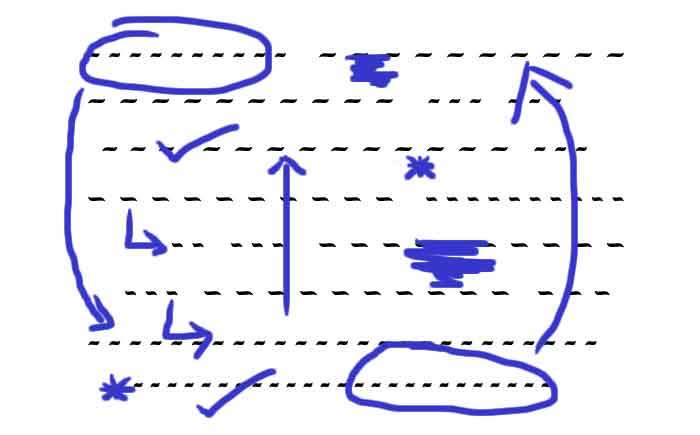
Needless to say, it didn’t work out too well for me.
There are many evaluation templates online and my suggestion is to try it all, then pick one that suits you best.
My friend uses the 6-pack template where he splits the paper into 6 sections and he always has a witty opening, 4 main points, and a resounding conclusion.
Another template I once saw was the House Template, where you split the evaluation sheet into the shape of a house. You start at the bottom (the foundation) and end with the climax (the roof).
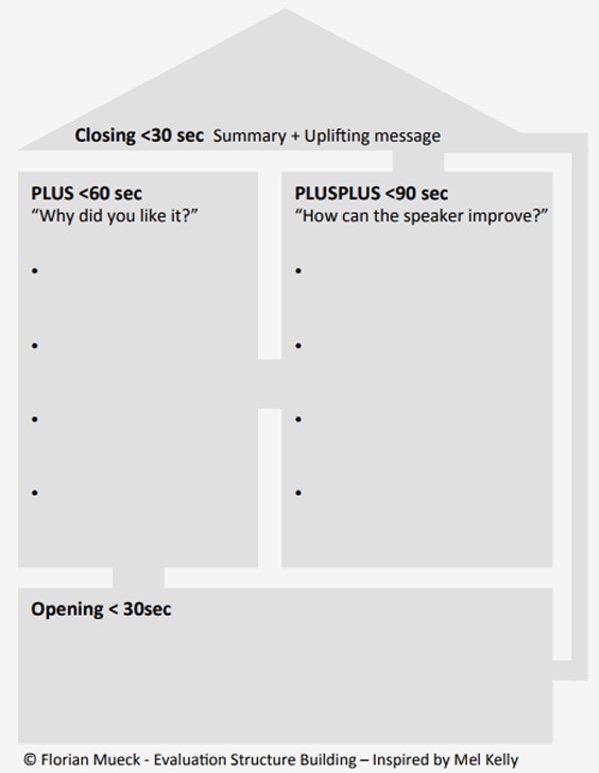
Another suggestion is to split the paper into 4 quadrants: general observations, what you liked, areas of improvements and the climax or what made the speech great.
I split my paper into 3 sections. One half for jotting down the content flow of the speech. One quarter for the positive points and another quarter for the areas of improvements.
I’ve seen some evaluators filling up the Pathways evaluation form and writing full sentences during the speech. I wouldn’t suggest it as I think you’d miss some important points but if it works for them, it works for them.
There is no right or wrong. Develop your own style.
Use 3rd Person Language
A 12-year Distinguished Toastmaster cum District Club Growth Director from New Zealand once told me to remember the word: Share.
When giving an evaluation, you should be sharing with the audience, not just to the speaker.
Instead of saying, "You have great eye contact," as you speak only to the speaker, share it with the audience.
"Ladies and gentlmen, Peter demonstrated great eye contact when he looked us in the eyes..."
I admit, sometimes I still forget about this point. My District's culture has always been to use 2nd person language for speech evaluations.
My suggestion:
To use both 2nd and 3rd-person language.
For example:
- (WHAT) Peter, I like that you had great stage presence and you moved around with purpose.
- (HOW) Ladies and gentlemen, when Peter shared about his childhood, he was standing on the left side of the stage. During his high school period, he moved to the center. And when he shared about his working life as an adult, he moved to the right of the stage.
- (WHY) When he does this, he brought us all along on a journey, and he moved around with a purpose, without being distracting at all.
- (WHY) But more importantly, Peter, when you did this, you brought yourself closer to all of us and included us all in your speech. Great job!
Remember the word: Share.
Do Not Number Your Points
Let me clarify:
You CAN number your points on your evaluation sheet. And you should number them to be organized.
But you do not want to say:
“I will split my evaluation into 2 points that I liked and 3 areas of improvements.”
The moment you say a number you are putting yourself in a trap.
What if time runs out and you are only on point number 2, but you mentioned you have 3 areas?
You are discrediting yourself.
Instead, just say “some areas I liked and some areas of improvements”.
Funny story: I made this mistake once. But instead of running out of time, I had more time left. After giving 2 areas of improvements, I said “As a bonus, I have one more suggestion for you.”
Write down as many points as you can but select just the top 2 or 3 points for the positives and negatives.
You can always share your observations with the speaker privately.
Don’t Say Something that They Can’t Change
I think this is obvious but I still see evaluators making this mistake.
Don’t tell them to change their accent.
Don’t tell them to change their looks.
Don’t tell them to change their clothes - unless it is a costume.
This goes back to a previous point:
Evaluate the speech, not the speaker.
Tips on Winning the Evaluation Speech Contest
Just by applying the above tips, you will be a great evaluator.
However, a contest setting is slightly different and you will be judged not only by your content, you will also be judged on your delivery.
The following tips will help you edge out your competitors in a contest. Take note that all tips above apply in a contest.
I aim to be as honest as possible and share all that I know. You may not agree with some of the points, and I don’t blame you.
I learnt the following tips from conversations with friends, mentors, workshops and Youtube videos by Loy Machedo and Jonathan Peng, among others.
Here is a great video by Loy Machedo. It is pretty long so I will summarize parts of it in written form.
Remember that an Evaluation is also a Performance
Like all speeches, especially in a contest, an evaluation speech is a performance.
That means you will be judged on your delivery as well as your content.
I’m not suggesting that you compromise on your content (it is still most important), but your mindset has to shift from “giving as much value as possible” and “helping the speaker” to “how can I deliver in a way that adds point to my speech”.
Your body language, stage presence and how you impress the audience matter a lot.
Some of the ways you can add points to your speech are to engage the audience, to have a themed evaluation, to use memorable acronyms, to include humour. (More on these later)
You may have to reduce the number of suggestions to have time for these bonus points.
See, I warned you that you might not agree with these points.
Focus on Judges, not Audience
There is a judging criteria and you’d want to study it.
Judges, technically, must follow the criteria and give you a score based on how well you fulfill the criteria.
Take a look at the criteria and you will notice that 70 points is on content (analytical quality and recommendations), 15 points on techniques and 15 on conclusion.
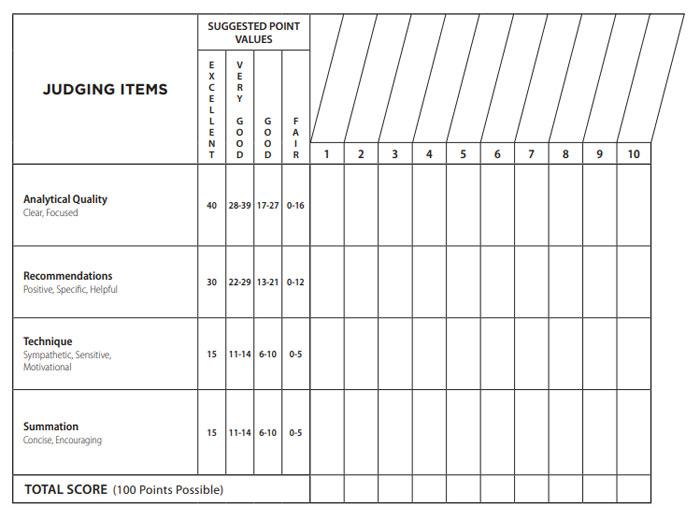
Let’s face it:
At a contest, everyone’s content is at a pretty good level. Every contestant will more or less suggest the same few things.
Now, I mentioned “technically” because not all judges will rank you based on the criteria. Judges are humans after all. Emotions get involved.
Which is why your technique is important (look back to the previous point). If you can impress the judges more than other contestants could, you win.
But more importantly, how you treat the judges is equally important.
At the area or club contest, it is pretty obvious who the judges are. At the higher levels, you’re out of luck.
Go club visiting regularly and be nice to everybody. Ask for advice from people. Be a PR agent. You never know who might be a future judge.
I once met someone at the toilet before the contest who later turned out to be a judge. Thankfully, I did not mistreat him.
Play on Emotions
Related to the previous point, Loy Machedo shared that there will always be a bias in the judges.
If you’re young, don’t be cocky. Don’t “act smart”. Stay humble.
If you’re more mature, look the part, suit up and enhance your maturity.
Don’t present yourself in a way that rubs people the wrong way.
This is controversial but I feel that I should point it out: Loy shared that he once told a handicapped contestant to play the sympathy card. He acted pitiful on stage, capitalized on his handicap and he won.
I prefer to win based on ability, but remember, judges have emotions too.
Remember to Conclude
Notice that in the judging criteria, 15% goes to the conclusion.
I have seen so many promising winners lose because of this.
They presented a humorous, themed evaluation, engaged the audience and impressed the judges, but they forgot to conclude.
When the results came out, many people wondered why they lost.
This is why.
A conclusion doesn’t have to be fancy; a simple sentence will do.
“All in all, I feel that you have…”
“To conclude, remember…”
“In summary, you are a great speaker because…”
Then say what you have said in point form.
Use the words “conclude” or “summary” if you worry that judges might not catch it.
Practice having a conclusion in every evaluation you give in normal club meetings just to develop the habit.
Have a Unique Positioning
Which would you remember better:
1 pink elephant or 8 grey elephants?

Ok, that example might not be realistic but you get the idea.
If there are 10 constants and if you say the same thing as everyone else, how would anyone remember you?
Be unique.
Most people use the same structure: what they liked & what could be improved.
Do something else. Use your name as an acronym, have a theme, or get the audience involved.
All these were used by past evaluation champions of District 80. One even paid homage to the nation by using the acronym SG 50 - the year Singapore turned 50.
Dress differently. If everyone wears a black suit, wear a maroon suit. (Good luck with this as more and more Toastmasters start wearing suits of all colours.)
Skip the obvious observations you know everyone talks about; like the vocal variety and body language. Offer some deep insights on the persuasion techniques used or the Hero’s Journey.
Make use of the entire stage. Stand out with your stage presence.
Being unique is especially important if you are the last speaker.
Subtle Authority Positioning
Confidence is a huge factor in contests.
Have an aura of confidence and authority. How?
Psychologically, believe you deserve to win.
Physiologically, stand tall, have poise, and own the stage.
Phrasally, use sentences like:
“I will give you a few ‘more advanced pointers’; both for you and the audience.”
“This is something that I noticed 80-90% of speakers do, including advanced speakers, so watch out…”
Sometimes, the mere fact of you contextualizing what you are going to say will make the audience believe that it is really an advanced pointer.
The most important thing is to say it with certainty.

Watch Your Tonality
To present yourself as an authority, you’d want to speak with a downward inflection tonality.
Not all the time, but in general.
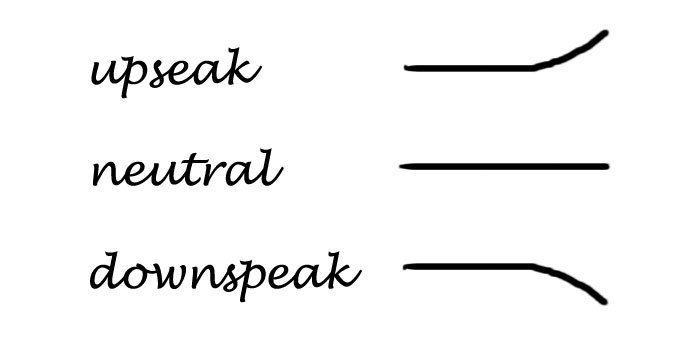
Studies have shown that people who speak with an upward inflection at the end of their sentences tend to be appear less confident and uncertain.
Would you believe an evaluator who sounded unsure?
The judges wouldn’t, as well.
You could also consider varying your pace and adding pauses to build up suspense and hold people’s attention.
Remember: an evaluation is a performance and vocal variety enhances a performance.
Get Audience’s Involvement
A sure way to stand out from the crowd and ‘wow’ the audience is to involve the audience.
The most common way to do that is, of course, to ask questions and get them to reply.
“Ladies and gentlemen, what could the speaker have done even better? Are you curious to hear about it?”
Besides questions, you can tell the audience to do something.
“Say yes if you learnt something from the speaker.”
“Show him a thumbs up if you think he did a great job.”
“Give her a heart if you liked her speech.” - followed by showing a Korean heart sign using your thumb and index finger.

Warning: when you do this, do it with an absolute belief that the audience will follow. If you do it weakly, the audience will probably not do it and you would be left hanging.
Not something you want to happen at a contest.
Humour
Humour is a powerful weapon in a speech.
It becomes a nuclear weapon in an evaluation because that is when humour is the least expected.
If you can start off with a good joke, you’d break the ice, build rapport and get everyone’s attention.
If you can use humour with your suggestions, you’d gain points for improvising.
If you use humour to end your evaluation, you’d leave a lasting impression.
Humour also helps to ‘soften the blow’ when you point out where they didn't do well.
When it comes to humour in evaluations, it has to be situational. Make a joke about the speech, the venue, or if you are confident enough, about yourself after listening to the speech.

My friend Thomas once evaluated a speaker named Jerry. He joked: “Jerry must be very desperate to seek advice from his arch-enemy, Tom.” The audience burst out laughing - because Tom and Jerry.
Simple works best. You don’t want to appear to be trying too hard.
Ride on the Shoulders of Giants
I’m always surprised by how much impact a quote from a famous person could make in an evaluation.
A quote makes you sound more credible because it implies that the person who said it agrees with you.
It also impresses the audience because it appears as if you thought of it in the 5 min you had to prepare.
A good source of quotes when it comes to giving evaluations would be the World Champions of Public Speaking. An example would be the one from Lance Miller above.
Some non-Toastmaster speakers you could quote are Patricia Fripp, a well-known speaking trainer, Tony Robbins and Zig Ziglar.
When it comes to quoting, it must be related to the topic, credible and well-known enough.
When I evaluate an icebreaker speech, I would say:
“Zig Ziglar once said, “You don’t have to be good to start, you have to start to be good.” Congratulations on starting your journey to greatness.”
Use Stock Phrases
One way to impress the audience is to prepare a set of phrases that you could use for any evaluation.
Bonus points if they consist of alliterations.
Here are some examples from past District Champions:
“They say a picture paints a thousand words, but a masterful speech can paint a thousand pictures.”
“Just like the Picasso of public speaking, you delivered a speech that was surreal and vivid through your command of the English language.”
“Your speech has enlightened our minds, enliven our hearts and enrapture our souls.”
“Let me put on my creative lenses to evaluate your speech.”
“Her story was remarkable, rejuvenating and her message, resounding. What an exciting and engaging story she had for us today.”
You don’t want to overdo this though.
Video Evaluations
To help improve your chain of thoughts and ability to write fast, practice with videos of speeches.
There are thousands of Toastmasters videos on Youtube; from newbie speakers to World Champions.
Look for those that are 5 to 7 min, then practice as if it is a contest environment; only write during the speech and 5 min after.
Then give an evaluation right after.
Record yourself and evaluate your evaluation.
Challenge yourself and do it at 1.5x normal speed so you have less time to form your speech.
You can also practice by writing down evaluations for all speakers whenever you visit a club. You don’t have to give an actual verbal evaluation, but practice jotting down and forming your speech on the spot.

Break Down World’s Best Speakers
To learn how to evaluate advanced speakers, you have to evaluate advanced speakers.
Don’t have the chance to do it at a club meeting?
Then evaluate all the past World Champion speeches on Youtube.
Go deep, deconstruct the speech line by line and scrutinize every single action, facial expression, and stage movement.
Then zoom out to see how the story could be told better.
Think of ways on how the speech can be improved.
If you can find just one thing to make the speech better, I would consider that a successful attempt.
Practice, Practice, Practice
I can’t stress this enough. As cliche as it sounds, practice makes progress.
When I first started giving evaluations, I did it occasionally. I would go overtime, way undertime and had lots of pause fillers.
Ask one trainer and he would tell you to give 1 + 2 points. Ask another and he would say 2 + 3. Ask another and he would tell you to fit all your observations in 1 min, your suggestions in another minute, and to conclude in 1.5 min (doesn’t make sense to me).
My suggestion?
Forget all those and find your own timing.
Only by practicing, you know your pace. And once you are comfortable with your pace, then, you decide how many points to suggest.
It was only through lots of consistent practice that I understood my speaking pace. I found the right number of points I could make, without going overtime, but still gave enough value.
As a bonus, my pause fillers started going away and the words came naturally to me.
Practice makes progress.
Conclusion: The Most Definite Speech Evaluation Guide
I recently joined my first evaluation contest. It was a combined club contest between 4 clubs in the west of Singapore.
It was a super challenging one as the test speaker talked about how evaluations could be different.
Can you imagine? Evaluating a speaker talking about evaluations.
In a way, there was a slight pressure to ‘be different’ otherwise the speaker is proving his point - that all evaluations are the same.
Furthermore, he used Powerpoint slides. He didn’t tell a typical story and there wasn’t any chance for him to demonstrate vocal variety and body language.
I had prepared a whole bank of stock phrases, alliterations, acronyms and whatnot.
In the end, I used none of those. I freaked out a little, because I didn’t realize 5 min went by so fast.
What kicked in were the weeks of evaluation practice I had.
I went back to basics, applied the principals I shared on this post, and even though I felt it could be better, I won the contest.
I have since continued going around the island giving evaluations. This is a never ending process and I hope all these tips help you as much as they have helped me.
Related: How to Conduct a Speech Analysis
